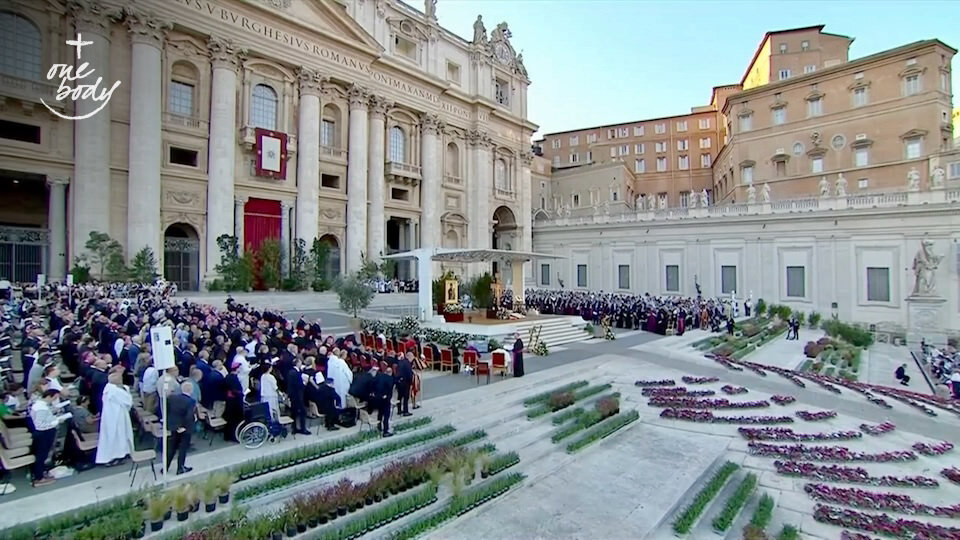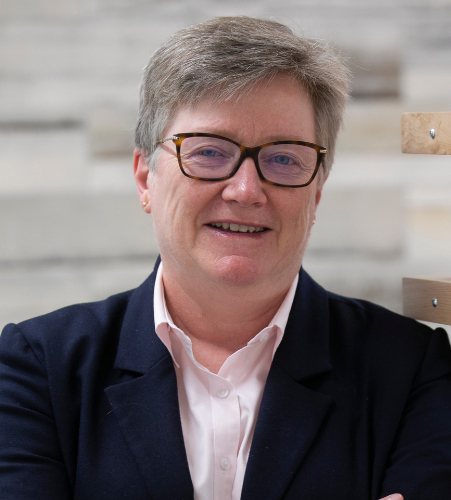

Synod: An Ecclesial Event in the Context of Prayer | One Body
Catherine E. Clifford
Thursday, December 7, 2023

Pope Francis, leaders of various churches and denominations, members of the Synod Assembly, and many more faithful gathered before the assembly for an Ecumenical Prayer Vigil in St. Peter's Square on September 30, 2023.

Synod: An Ecclesial Event in the Context of Prayer
by Dr. Catherine E. Clifford
Synods are ecclesial gatherings, intense moments of reflection on the Word of God symbolized by the presence of the Book of the Gospels enthroned in the midst of the assembly. The month-long General Assembly of the 16th Synod, which met in Rome from October 4 to 29, was an experience of prayerful listening. It began with an Ecumenical Prayer Vigil organized by the Taizé community on September 30, where young people from many countries led a series of meditations and intercessions for the world. Their words and gestures recalled the purpose of the synodal process: to help us become a church more responsive to the call to mission and service of the poor and those who suffer. Pope Francis presided over the vigil together with the heads of the Christian World Communions. Their gathering for common prayer symbolized in many respects the fact that the effort of conversion and renewal of the Catholic Church has profound implications for all Christians and for the future of Christian unity. All Christian communities are under stress today, and confront significant challenges. Together, we are learning and receiving from one another’s best practices as we strive to better reflect the loving presence of God in the world. The vigil was followed by a three-day spiritual retreat where participants were challenged by the messages of Fr. Timothy Radcliffe, OP, who spoke of God’s home among us and of the Gospel vision of authority and truth. Following times for personal prayer, we began to learn the practice of conversation in the Spirit that would become the modus operandi in the weeks ahead. The schedule of the assembly, which began on October 4, was broken down into five stages or modules. Each began with a liturgy in St. Peter's Basilica, followed by a biblical reflection, another spiritual exhortation, and input from theological advisors – setting the tone and calling us to the task at hand. Each day began with an invocation of the Holy Spirit and morning prayer. Conversations in small groups and plenary interventions were punctuated by moments of silent reflection and prayer. Liturgies were celebrated in different languages, and reflected the various cultures and traditions of East and West. A Sharing of the Gifts of all the Faithful The physical arrangement and the process of spiritual conversation, where non-bishops acted as facilitators, was a radical departure from the style of any previous Synod. Prior meetings had been held in the Synod Hall, where bishops sat theatre-style in order of rank and precedence. When it came time to address the assembly, those of higher rank would go to the front of the line. The dynamic was more one of speech making and debate, than of reflection on lived realities. Bishops worked in small language groups in previous synods as at this one, but the format was quite different. For this assembly, delegates sat face to face at round tables: patriarchs, bishops, deacons, priests, religious and lay persons – men and women, young and old. Each had the same opportunity to speak in small groups or in plenary sessions. Others listened, without judgment, without interruption. Participants were invited again to reflect in silence on what we had heard. What was the Spirit asking of us as we reflected together on the lived experience of local faith communities? Some question Pope Francis’ decision to broaden the list of those invited to include the full participation of non-episcopal delegates, fearing that their presence might undermine the authoritative role of the bishops. However, the introduction to the interim Synthesis Report that came out after the Assembly expresses the importance of their participation: “Lay people, those in consecrated life, deacons and priests were, together with the bishops, witnesses of a process that intends to involve the whole Church and everyone in the Church.” All delegates have contributed in important ways to the consultation that took place in the local churches. They are women and men who seek to live the Gospel and have given their lives in loving service of the church. They ensure that the concerns of the local churches continue to be heard and symbolize the link between the synodal assembly and the broad consultation that preceded it. The synod, in its present constitution, remains a consultative body offering advice to the pope, giving voice to the experience of the local churches on matters of concern to the whole church. The process of spiritual conversation that characterized the October assembly is one where no single voice could dominate. It fosters a climate and culture of respectful listening, even to those with whom we disagree. Both the seating arrangements and the dynamics of spiritual conversation challenge us to break down the barriers created by the culture of clericalism. They move us from the binary of clergy and laity to a non-competitive culture where we welcome the complementarity of vocations and charisms, all sharing the same dignity as members of the baptized faithful. Through the experience participants grew together as a community and came to recognize one another more fully as brothers and sisters in Christ. The synod was a learning process for all. It modeled a practice that might be transposed to the local churches. The “Sense of the Faithful” and the Catholicity of a World Church Pope Francis has repeatedly exhorted bishops to attend to the “sense of the faithful,” to the wisdom of the living faith borne by all the baptized, who are guided by the Holy Spirit. This vision of the church, deeply rooted in the understanding of the early church fathers, was taken up in Vatican II's teaching on the church as both a Mystery of Communion and the Pilgrim People of God. Listening to the simple faith of ordinary faithful Christians, relying on the competencies, gifts, and charisms of the non-ordained faithful takes nothing away from the authority that is proper to the episcopal office. Rather, it enables the whole college of bishops to better proclaim the faith of the whole church. This more collaborative and transparent style of leadership enhances the pastoral character of their authoritative teaching office. Engaging in conversation with participants from every corner of the world placed us before the true catholicity of the church. Such diversity is at once enriching, yet challenging. It helps us to appreciate more fully the variety of lived experience and the creativity of the local churches as they seek to live the gospel in diverse social and cultural contexts. It also places us before the complexities and challenges of maintaining communion. The synod is a microcosm of a truly “catholic” Church. In the coming months, local churches will be invited to study and respond to the interim Synthesis Report, to consider whether it adequately reflects their present needs, concerns, and priorities. In its Letter to the People of God, synod participants acknowledge that in order “to progress in its synodal discernment, the Church absolutely needs to listen to everyone, especially the poorest.” Your continued participation through prayer, study, and conversation, is of great importance as the whole church continues on the path of synodal conversion. Dr. Catherine E. Clifford is Professor of Systematic and Historical Theology at Saint Paul University in Ottawa, Ontario. Her research interests and publications are focused primarily in the areas of ecclesiology, ecumenism, and the history of the Second Vatican Council, with a particular emphasis on the understanding of conversion and renewal of the churches, the development of doctrines, and the unity and diversity of Christian communions within the world Christian movement. These questions are of great significance given the changing role of the church in contemporary society. Catherine is a dynamic teacher who enjoys engaging with students from diverse horizons. Her courses explore the changing role and methodologies of theology as theologians seek to reflect on contemporary issues in service of church and society. In October, 2023, she served as a member of the Synod Assembly in Rome.
Dr. Catherine E. Clifford is Professor of Systematic and Historical Theology at Saint Paul University in Ottawa, Ontario. Her research interests and publications are focused primarily in the areas of ecclesiology, ecumenism, and the history of the Second Vatican Council, with a particular emphasis on the understanding of conversion and renewal of the churches, the development of doctrines, and the unity and diversity of Christian communions within the world Christian movement. These questions are of great significance given the changing role of the church in contemporary society. Catherine is a dynamic teacher who enjoys engaging with students from diverse horizons. Her courses explore the changing role and methodologies of theology as theologians seek to reflect on contemporary issues in service of church and society. In October, 2023, she served as a member of the Synod Assembly in Rome.Related Articles:
<<













